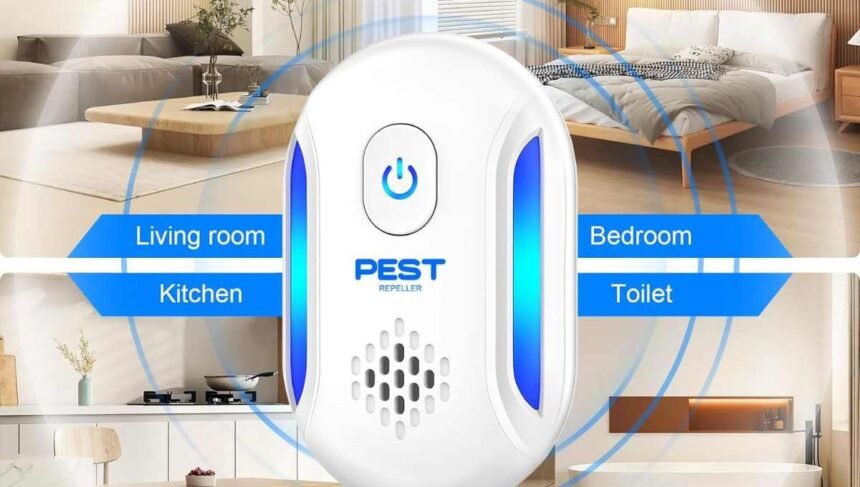You’ve probably heard of ultrasonic pest repellers if you’re a homeowner who has had to deal with mice, insects, or other bugs that you don’t want.
These things say they can get rid of pests without using harsh chemicals or traps by using high-frequency sound waves. But do they work? It’s hard to say the truth, and many people have different ideas about it.
This in-depth piece will go over the science behind ultrasonic pest repellers, look at studies that show how well they work, and give you expert advice to help you make a choice.
Understanding Ultrasonic Sound
It’s important to know what ultrasonic sound is and how different animals hear it before we look into whether ultrasonic bug repellers work.
Waves of sound that are higher than the highest frequency that humans can hear are called ultrasonic sound. This frequency is usually around 20,000 Hz (Hertz, or cycles per second).
Most people can’t hear these high-frequency sounds, but many animals, like mice, insects, and some birds, can hear and react to them.
Ultrasonic pest repellers work by sending out high-frequency sound waves that certain pests find unpleasant or even painful. This makes them leave the area.
But how well these devices work varies on a number of things, such as the frequency used, the pest’s hearing range, and the conditions of the environment.
Scientific Studies and Expert Opinions
So, do sound devices really get rid of pests? Many studies have been done by scientists to look into how well they work, and the results have been mixed.
A blog post from 2016 from Cornell University’s New York State Integrated Pest Management program says that ultrasonic devices have not been shown to kill German cockroaches, bed bugs, or mice.
Different experts have different ideas about how well ultrasonic bug repellers work. Dr. Michael Merchant, an ecologist who studies cities at Texas A&M University, doesn’t think they will be very useful.
His words to The New York Times were, “There’s just no solid scientific evidence that these things work.” Everyone would use them if they worked.
But some experts think that ultrasonic pest repellents can work in some cases and against some types of pests.
A pest control expert at the University of Sheffield named Dr. Richard Naylor says that ultrasonic devices might work better in smaller, more enclosed areas where the sound waves can be focused.
Factors Affecting Effectiveness
Several factors can influence the effectiveness of ultrasonic pest repellers, including:
- Frequency Range: Different pests have varying hearing ranges, and the ultrasonic frequency emitted by the device must match the range that the target pest can detect. For example, some devices may be effective against rodents but not insects, or vice versa.
- Environmental Conditions: Sound waves can be absorbed or reflected by various materials, such as walls, furniture, or carpeting. This can diminish the intensity and effectiveness of the ultrasonic signals.
- Pest Behavior: Some pests may become desensitized or habituated to the ultrasonic sounds over time, rendering the devices less effective.
- Device Quality: Not all ultrasonic pest repellers are created equal. Some low-quality devices may not emit the correct frequencies or produce sound waves with sufficient intensity to be effective.
Expert Suggestions and Best Practices
While the effectiveness of ultrasonic pest repellers is debated, experts generally agree that they should not be relied upon as a sole solution for pest control. Instead, they recommend incorporating ultrasonic devices as part of an integrated pest management (IPM) strategy that includes other proven methods, such as:
- Sanitation and Exclusion: Maintaining a clean environment and sealing off potential entry points for pests can significantly reduce their ability to thrive in your home or business.
- Traps and Baits: Traditional traps and baits can be effective in controlling certain pests, especially when used in conjunction with other methods.
- Professional Pest Control Services: For severe or persistent infestations, it may be necessary to enlist the help of a professional pest control company that can provide targeted treatments and ongoing monitoring.
If you decide to try ultrasonic pest repellers, experts recommend following these best practices:
- Research and choose a reputable brand that has been tested and proven effective for your specific pest problem.
- Follow the manufacturer’s instructions carefully, including proper placement and maintenance of the devices.
- Monitor the situation and be prepared to adjust your approach or seek professional help if the ultrasonic repellers prove ineffective.
- Consider combining ultrasonic repellers with other IPM methods for better results.
The Bottom Line
Scientists and experts have different ideas about whether or not ultrasonic pest repellers work. The fight is still going on. There is some proof that these devices may work in some situations and against some pests, but it is not clear how well they work overall, so they shouldn’t be used as the only way to get rid of pests.
It’s important to have realistic expectations about ultrasonic pest repellers and use them as part of a complete integrated pest control plan if you want to use them. Additionally, talking to pros in pest control and following best practices can help get the most out of these devices.
In the end, whether you use ultrasonic pest repellers will rest on the type of pests you have, the environment, and your willingness to try new things. You can improve your chances of getting rid of pests in a safe and effective way by staying informed and looking at the situation as a whole.
Frequently Ask Questions
Can ultrasonic pest repellers interfere with other electronic devices in my home?
While ultrasonic frequencies are generally inaudible to humans, some people have reported interference or noise from ultrasonic devices affecting their televisions, radios, or other electronics. This can be due to the high-frequency signals being picked up by these devices.
Are ultrasonic pest repellers safe for use around children and pregnant women?
There is limited research on the potential effects of prolonged exposure to ultrasonic frequencies on developing fetuses or young children. Some experts recommend exercising caution and avoiding the use of ultrasonic devices in nurseries or areas where pregnant women or infants spend a significant amount of time, as a precautionary measure.
Can ultrasonic pest repellers damage my home’s structure or materials?
In my research, I don’t think so. While ultrasonic frequencies are generally considered safe for most materials, some studies have suggested that prolonged exposure to high-intensity ultrasonic waves could potentially cause microscopic damage to certain materials over time, such as plastics or rubbers.
Do ultrasonic pest repellers work equally well for all types of pests?
No, the effectiveness of ultrasonic repellers can vary depending on the specific pest species and their hearing ranges. For example, some devices may be more effective against rodents than insects, or vice versa.
Can ultrasonic pest repellers be used in commercial or industrial settings?
While many ultrasonic devices are designed for residential use, there are also commercial-grade ultrasonic repellers available for larger spaces or industrial settings. These devices often have higher power output and may include additional features like multiple frequency settings or remote control capabilities.
How long do ultrasonic pest repellers typically last before needing replacement?
The lifespan of ultrasonic pest repellers can vary depending on the quality of the device and the manufacturer. Some units may last several years, while others may need to be replaced more frequently.
Can ultrasonic pest repellers be used in combination with other pest control methods?
Absolutely. Many experts recommend using ultrasonic repellers as part of an integrated pest management (IPM) strategy that combines multiple methods for optimal effectiveness. Ultrasonic devices can be used in conjunction with physical barriers, traps, baits, or even professional pest control services when dealing with persistent or severe infestations.



